Management Analysis: Imperial Hotel's Staff Issues & Solutions
VerifiedAdded on 2024/05/14
|12
|3297
|169
Report
AI Summary
This report analyzes the management and operational challenges faced by the Imperial Hotel, focusing on high operating costs due to poor control procedures and staff inefficiencies. The core issues stem from staff turnover, negative work culture, unethical working environment, and inefficient leadership. The report suggests Peter Farnsworth, the general manager, adopt Taylor's principles for scientific management, functional leadership theory, and a situational approach to leadership. Recommendations include implementing a 12-month plan for performance measurement, applying a total quality management approach to improve processes and organizational culture, and linking incentive schemes to performance. The report concludes by advocating for a behavioral management approach, emphasizing training for departmental heads, ethical leadership, and utilizing opportunities for employee retention and sustainable growth.
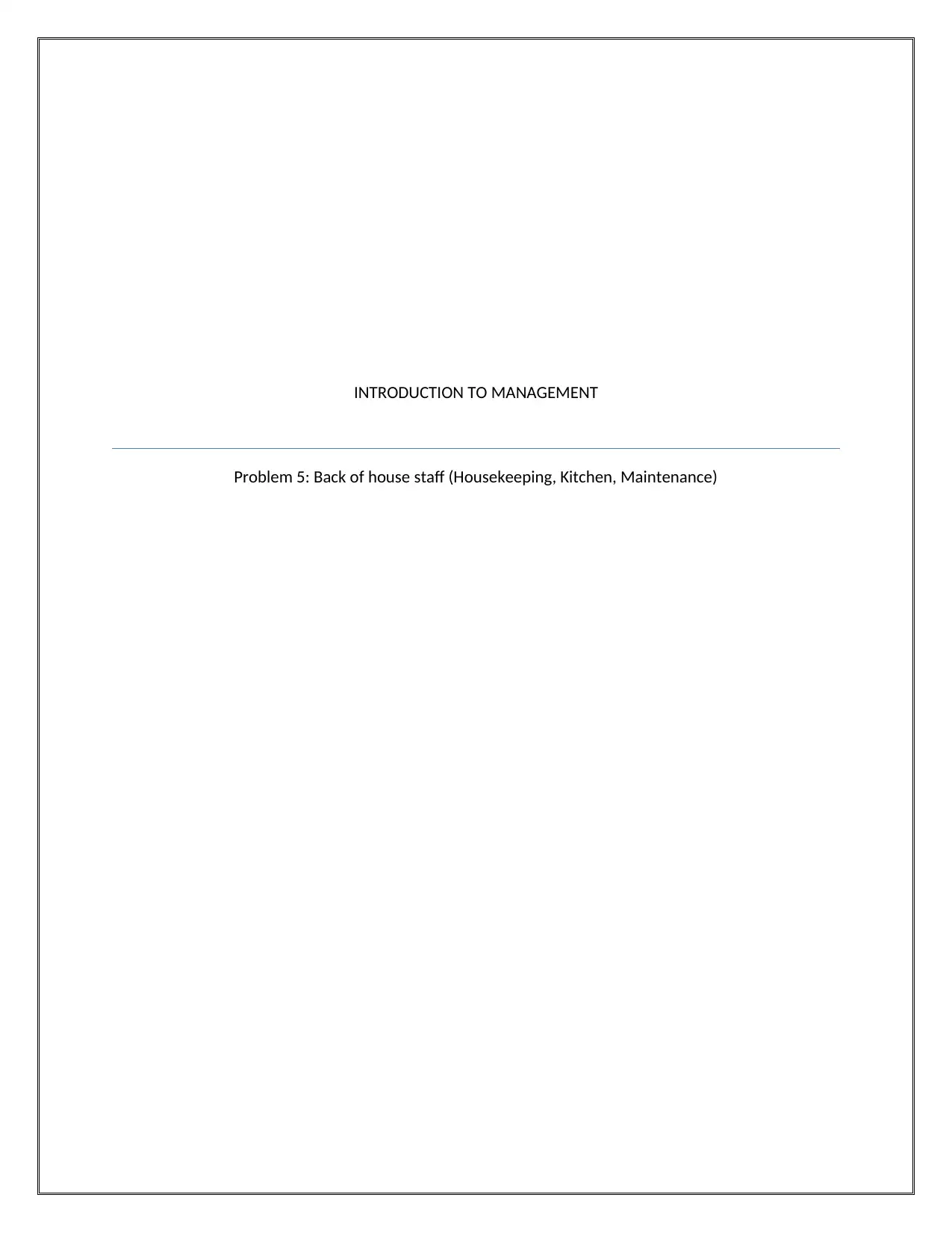
INTRODUCTION TO MANAGEMENT
Problem 5: Back of house staff (Housekeeping, Kitchen, Maintenance)
Problem 5: Back of house staff (Housekeeping, Kitchen, Maintenance)
Paraphrase This Document
Need a fresh take? Get an instant paraphrase of this document with our AI Paraphraser
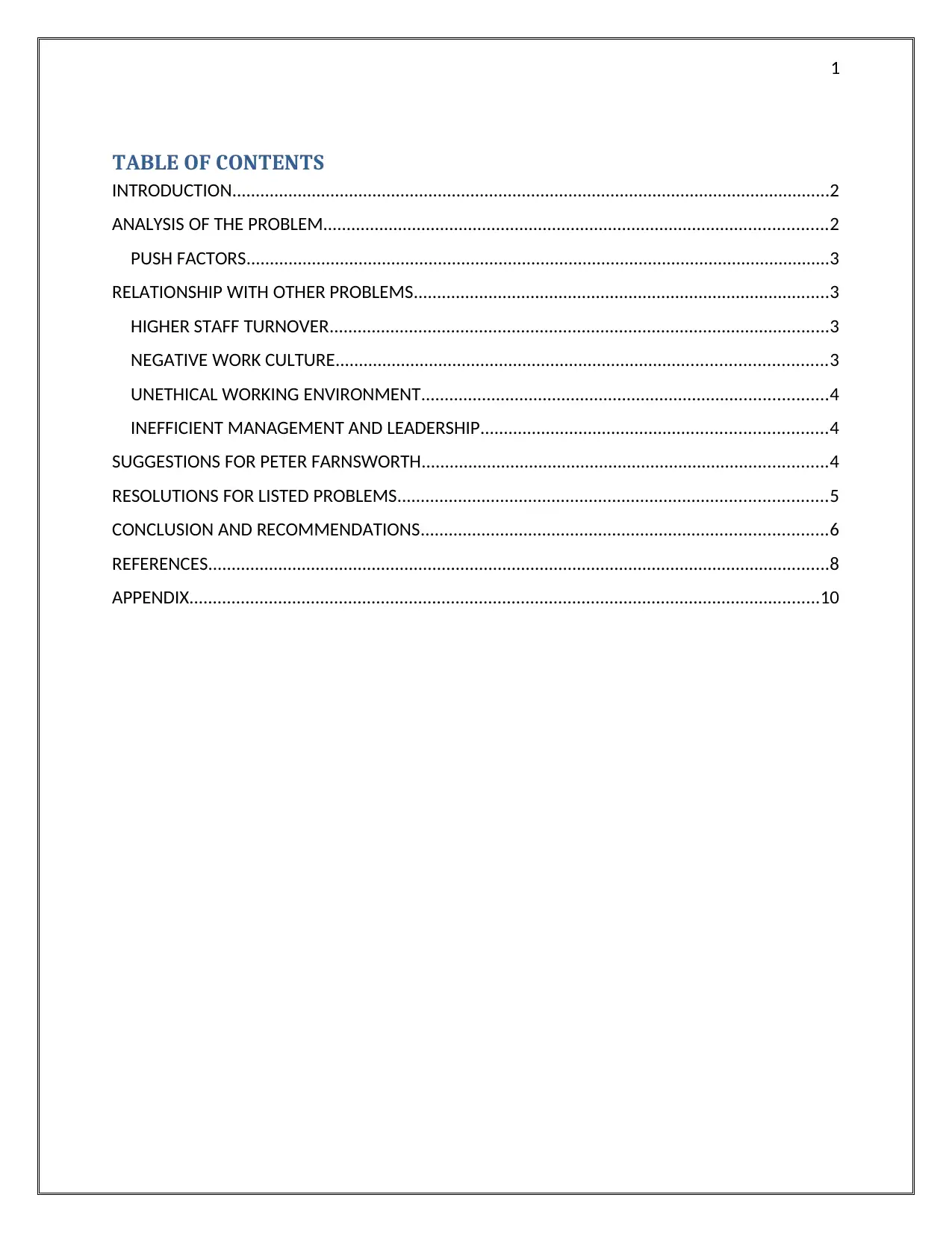
1
TABLE OF CONTENTS
INTRODUCTION................................................................................................................................2
ANALYSIS OF THE PROBLEM............................................................................................................2
PUSH FACTORS.............................................................................................................................3
RELATIONSHIP WITH OTHER PROBLEMS.........................................................................................3
HIGHER STAFF TURNOVER...........................................................................................................3
NEGATIVE WORK CULTURE.........................................................................................................3
UNETHICAL WORKING ENVIRONMENT.......................................................................................4
INEFFICIENT MANAGEMENT AND LEADERSHIP..........................................................................4
SUGGESTIONS FOR PETER FARNSWORTH.......................................................................................4
RESOLUTIONS FOR LISTED PROBLEMS............................................................................................5
CONCLUSION AND RECOMMENDATIONS.......................................................................................6
REFERENCES.....................................................................................................................................8
APPENDIX.......................................................................................................................................10
TABLE OF CONTENTS
INTRODUCTION................................................................................................................................2
ANALYSIS OF THE PROBLEM............................................................................................................2
PUSH FACTORS.............................................................................................................................3
RELATIONSHIP WITH OTHER PROBLEMS.........................................................................................3
HIGHER STAFF TURNOVER...........................................................................................................3
NEGATIVE WORK CULTURE.........................................................................................................3
UNETHICAL WORKING ENVIRONMENT.......................................................................................4
INEFFICIENT MANAGEMENT AND LEADERSHIP..........................................................................4
SUGGESTIONS FOR PETER FARNSWORTH.......................................................................................4
RESOLUTIONS FOR LISTED PROBLEMS............................................................................................5
CONCLUSION AND RECOMMENDATIONS.......................................................................................6
REFERENCES.....................................................................................................................................8
APPENDIX.......................................................................................................................................10
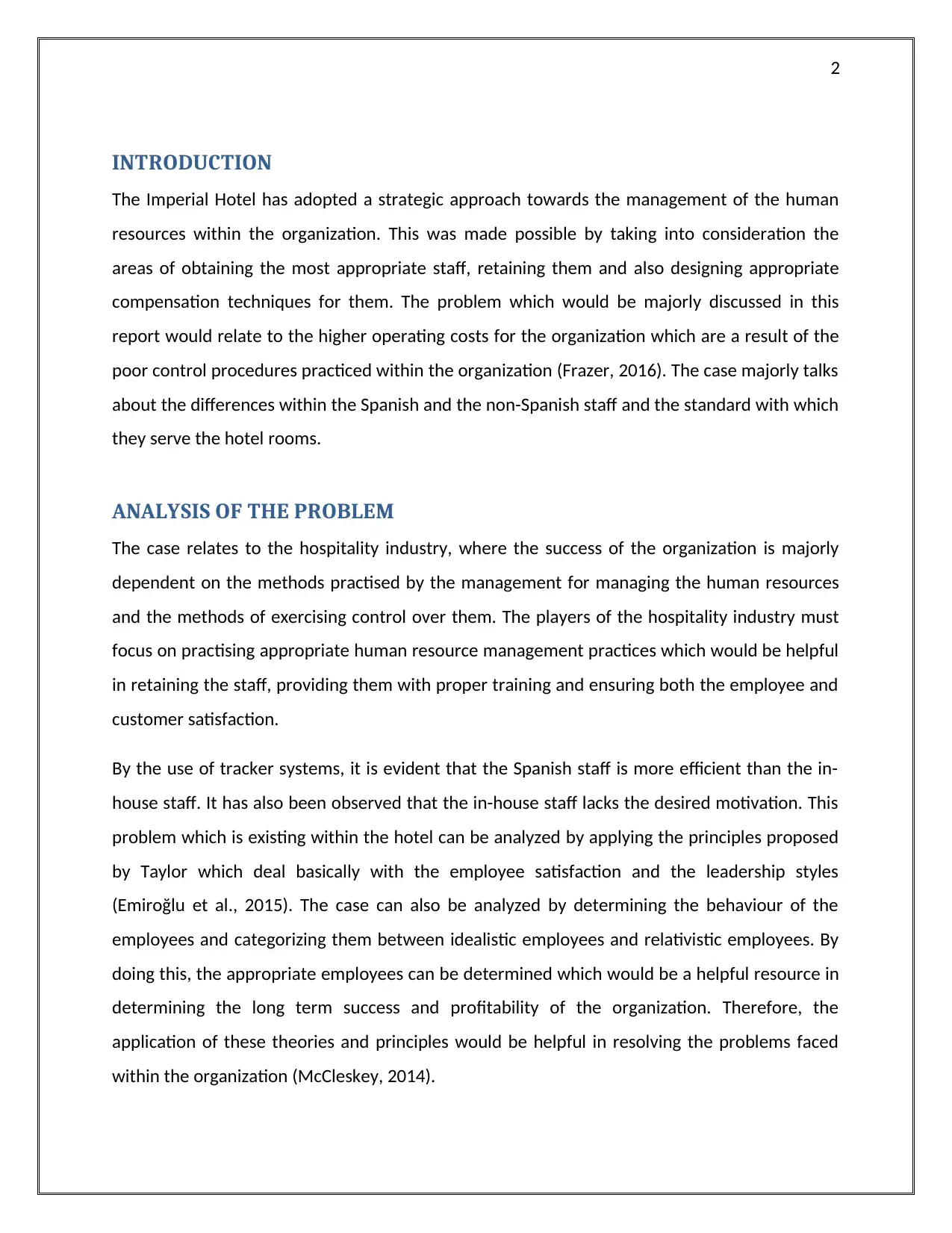
2
INTRODUCTION
The Imperial Hotel has adopted a strategic approach towards the management of the human
resources within the organization. This was made possible by taking into consideration the
areas of obtaining the most appropriate staff, retaining them and also designing appropriate
compensation techniques for them. The problem which would be majorly discussed in this
report would relate to the higher operating costs for the organization which are a result of the
poor control procedures practiced within the organization (Frazer, 2016). The case majorly talks
about the differences within the Spanish and the non-Spanish staff and the standard with which
they serve the hotel rooms.
ANALYSIS OF THE PROBLEM
The case relates to the hospitality industry, where the success of the organization is majorly
dependent on the methods practised by the management for managing the human resources
and the methods of exercising control over them. The players of the hospitality industry must
focus on practising appropriate human resource management practices which would be helpful
in retaining the staff, providing them with proper training and ensuring both the employee and
customer satisfaction.
By the use of tracker systems, it is evident that the Spanish staff is more efficient than the in-
house staff. It has also been observed that the in-house staff lacks the desired motivation. This
problem which is existing within the hotel can be analyzed by applying the principles proposed
by Taylor which deal basically with the employee satisfaction and the leadership styles
(Emiroğlu et al., 2015). The case can also be analyzed by determining the behaviour of the
employees and categorizing them between idealistic employees and relativistic employees. By
doing this, the appropriate employees can be determined which would be a helpful resource in
determining the long term success and profitability of the organization. Therefore, the
application of these theories and principles would be helpful in resolving the problems faced
within the organization (McCleskey, 2014).
INTRODUCTION
The Imperial Hotel has adopted a strategic approach towards the management of the human
resources within the organization. This was made possible by taking into consideration the
areas of obtaining the most appropriate staff, retaining them and also designing appropriate
compensation techniques for them. The problem which would be majorly discussed in this
report would relate to the higher operating costs for the organization which are a result of the
poor control procedures practiced within the organization (Frazer, 2016). The case majorly talks
about the differences within the Spanish and the non-Spanish staff and the standard with which
they serve the hotel rooms.
ANALYSIS OF THE PROBLEM
The case relates to the hospitality industry, where the success of the organization is majorly
dependent on the methods practised by the management for managing the human resources
and the methods of exercising control over them. The players of the hospitality industry must
focus on practising appropriate human resource management practices which would be helpful
in retaining the staff, providing them with proper training and ensuring both the employee and
customer satisfaction.
By the use of tracker systems, it is evident that the Spanish staff is more efficient than the in-
house staff. It has also been observed that the in-house staff lacks the desired motivation. This
problem which is existing within the hotel can be analyzed by applying the principles proposed
by Taylor which deal basically with the employee satisfaction and the leadership styles
(Emiroğlu et al., 2015). The case can also be analyzed by determining the behaviour of the
employees and categorizing them between idealistic employees and relativistic employees. By
doing this, the appropriate employees can be determined which would be a helpful resource in
determining the long term success and profitability of the organization. Therefore, the
application of these theories and principles would be helpful in resolving the problems faced
within the organization (McCleskey, 2014).
⊘ This is a preview!⊘
Do you want full access?
Subscribe today to unlock all pages.

Trusted by 1+ million students worldwide
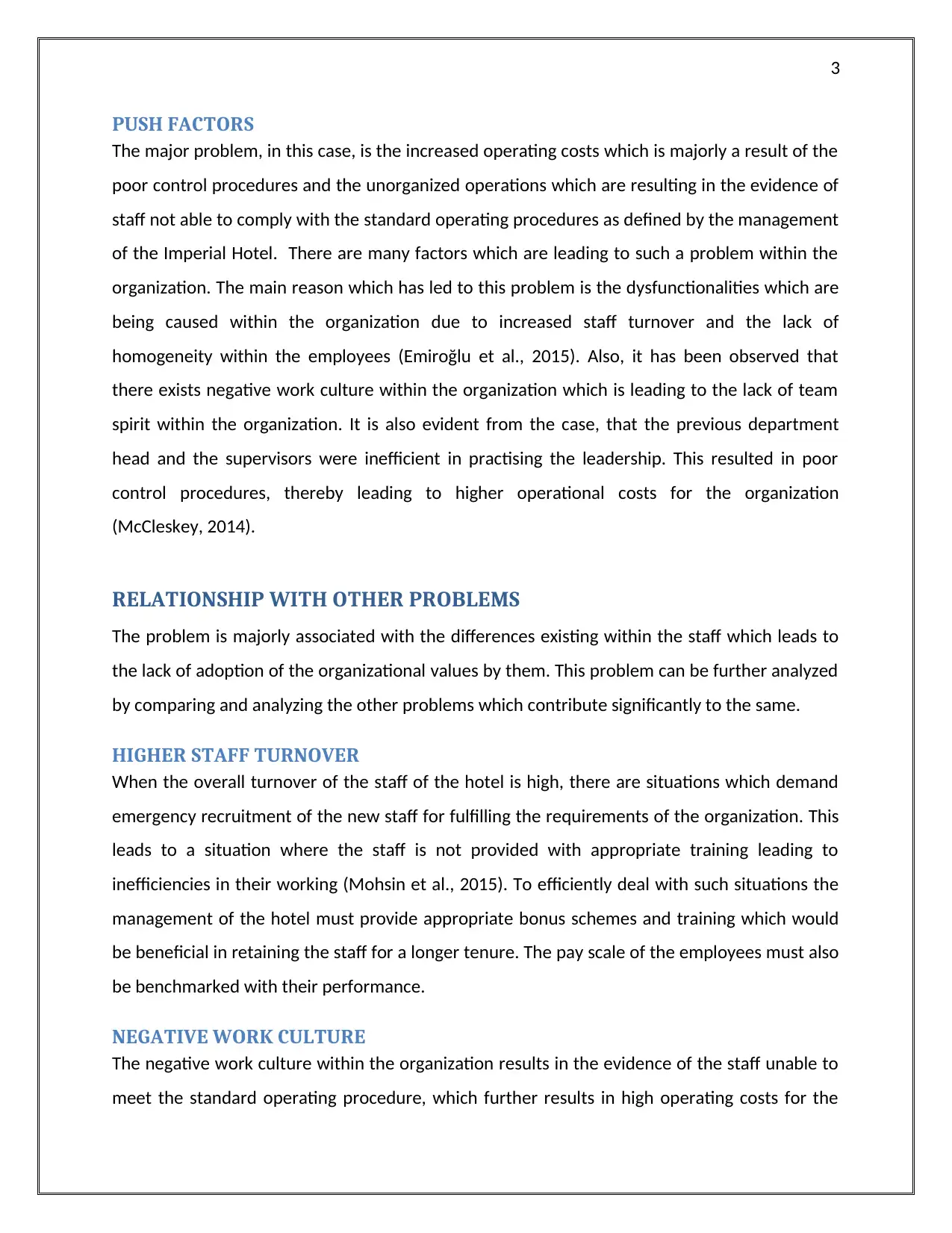
3
PUSH FACTORS
The major problem, in this case, is the increased operating costs which is majorly a result of the
poor control procedures and the unorganized operations which are resulting in the evidence of
staff not able to comply with the standard operating procedures as defined by the management
of the Imperial Hotel. There are many factors which are leading to such a problem within the
organization. The main reason which has led to this problem is the dysfunctionalities which are
being caused within the organization due to increased staff turnover and the lack of
homogeneity within the employees (Emiroğlu et al., 2015). Also, it has been observed that
there exists negative work culture within the organization which is leading to the lack of team
spirit within the organization. It is also evident from the case, that the previous department
head and the supervisors were inefficient in practising the leadership. This resulted in poor
control procedures, thereby leading to higher operational costs for the organization
(McCleskey, 2014).
RELATIONSHIP WITH OTHER PROBLEMS
The problem is majorly associated with the differences existing within the staff which leads to
the lack of adoption of the organizational values by them. This problem can be further analyzed
by comparing and analyzing the other problems which contribute significantly to the same.
HIGHER STAFF TURNOVER
When the overall turnover of the staff of the hotel is high, there are situations which demand
emergency recruitment of the new staff for fulfilling the requirements of the organization. This
leads to a situation where the staff is not provided with appropriate training leading to
inefficiencies in their working (Mohsin et al., 2015). To efficiently deal with such situations the
management of the hotel must provide appropriate bonus schemes and training which would
be beneficial in retaining the staff for a longer tenure. The pay scale of the employees must also
be benchmarked with their performance.
NEGATIVE WORK CULTURE
The negative work culture within the organization results in the evidence of the staff unable to
meet the standard operating procedure, which further results in high operating costs for the
PUSH FACTORS
The major problem, in this case, is the increased operating costs which is majorly a result of the
poor control procedures and the unorganized operations which are resulting in the evidence of
staff not able to comply with the standard operating procedures as defined by the management
of the Imperial Hotel. There are many factors which are leading to such a problem within the
organization. The main reason which has led to this problem is the dysfunctionalities which are
being caused within the organization due to increased staff turnover and the lack of
homogeneity within the employees (Emiroğlu et al., 2015). Also, it has been observed that
there exists negative work culture within the organization which is leading to the lack of team
spirit within the organization. It is also evident from the case, that the previous department
head and the supervisors were inefficient in practising the leadership. This resulted in poor
control procedures, thereby leading to higher operational costs for the organization
(McCleskey, 2014).
RELATIONSHIP WITH OTHER PROBLEMS
The problem is majorly associated with the differences existing within the staff which leads to
the lack of adoption of the organizational values by them. This problem can be further analyzed
by comparing and analyzing the other problems which contribute significantly to the same.
HIGHER STAFF TURNOVER
When the overall turnover of the staff of the hotel is high, there are situations which demand
emergency recruitment of the new staff for fulfilling the requirements of the organization. This
leads to a situation where the staff is not provided with appropriate training leading to
inefficiencies in their working (Mohsin et al., 2015). To efficiently deal with such situations the
management of the hotel must provide appropriate bonus schemes and training which would
be beneficial in retaining the staff for a longer tenure. The pay scale of the employees must also
be benchmarked with their performance.
NEGATIVE WORK CULTURE
The negative work culture within the organization results in the evidence of the staff unable to
meet the standard operating procedure, which further results in high operating costs for the
Paraphrase This Document
Need a fresh take? Get an instant paraphrase of this document with our AI Paraphraser
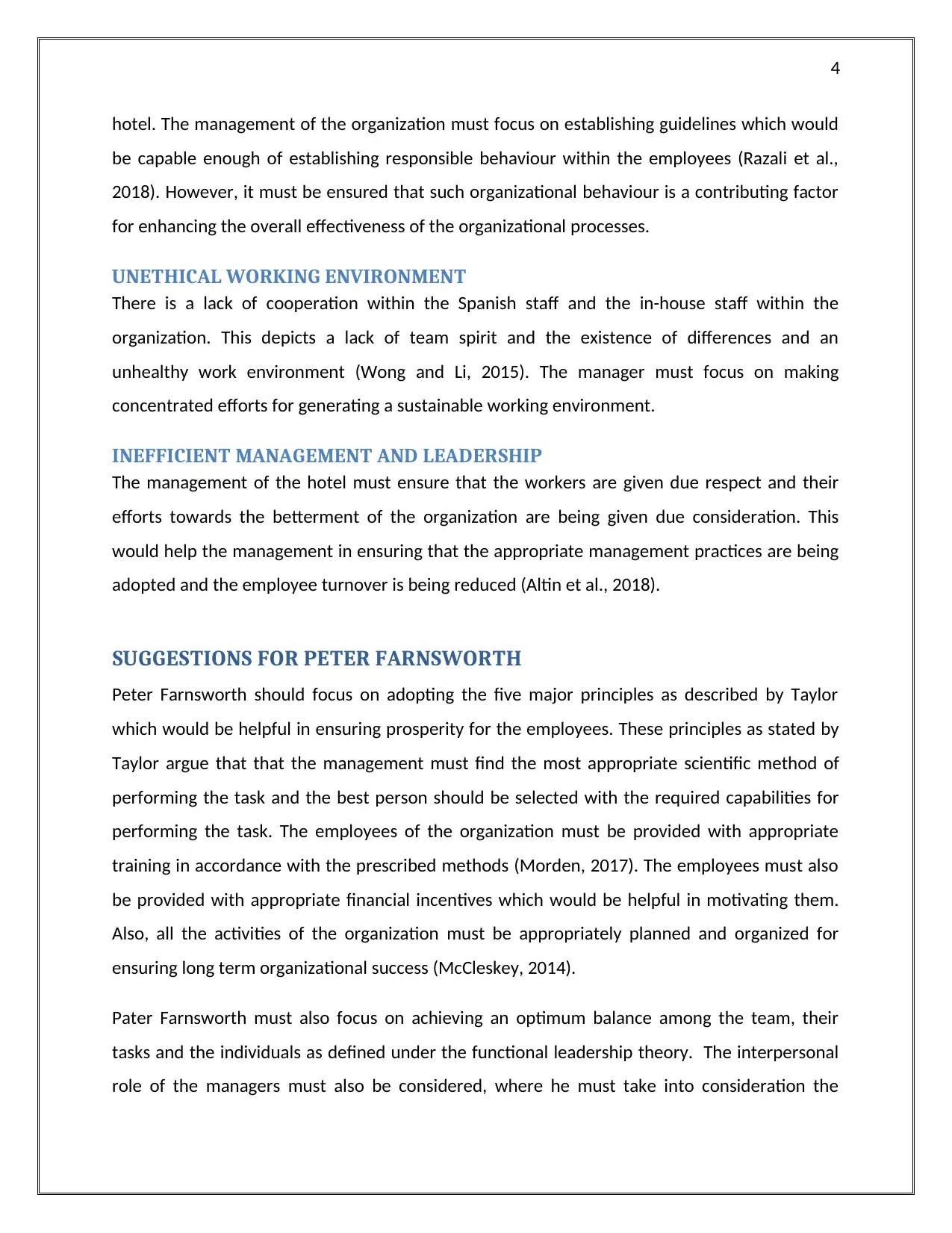
4
hotel. The management of the organization must focus on establishing guidelines which would
be capable enough of establishing responsible behaviour within the employees (Razali et al.,
2018). However, it must be ensured that such organizational behaviour is a contributing factor
for enhancing the overall effectiveness of the organizational processes.
UNETHICAL WORKING ENVIRONMENT
There is a lack of cooperation within the Spanish staff and the in-house staff within the
organization. This depicts a lack of team spirit and the existence of differences and an
unhealthy work environment (Wong and Li, 2015). The manager must focus on making
concentrated efforts for generating a sustainable working environment.
INEFFICIENT MANAGEMENT AND LEADERSHIP
The management of the hotel must ensure that the workers are given due respect and their
efforts towards the betterment of the organization are being given due consideration. This
would help the management in ensuring that the appropriate management practices are being
adopted and the employee turnover is being reduced (Altin et al., 2018).
SUGGESTIONS FOR PETER FARNSWORTH
Peter Farnsworth should focus on adopting the five major principles as described by Taylor
which would be helpful in ensuring prosperity for the employees. These principles as stated by
Taylor argue that that the management must find the most appropriate scientific method of
performing the task and the best person should be selected with the required capabilities for
performing the task. The employees of the organization must be provided with appropriate
training in accordance with the prescribed methods (Morden, 2017). The employees must also
be provided with appropriate financial incentives which would be helpful in motivating them.
Also, all the activities of the organization must be appropriately planned and organized for
ensuring long term organizational success (McCleskey, 2014).
Pater Farnsworth must also focus on achieving an optimum balance among the team, their
tasks and the individuals as defined under the functional leadership theory. The interpersonal
role of the managers must also be considered, where he must take into consideration the
hotel. The management of the organization must focus on establishing guidelines which would
be capable enough of establishing responsible behaviour within the employees (Razali et al.,
2018). However, it must be ensured that such organizational behaviour is a contributing factor
for enhancing the overall effectiveness of the organizational processes.
UNETHICAL WORKING ENVIRONMENT
There is a lack of cooperation within the Spanish staff and the in-house staff within the
organization. This depicts a lack of team spirit and the existence of differences and an
unhealthy work environment (Wong and Li, 2015). The manager must focus on making
concentrated efforts for generating a sustainable working environment.
INEFFICIENT MANAGEMENT AND LEADERSHIP
The management of the hotel must ensure that the workers are given due respect and their
efforts towards the betterment of the organization are being given due consideration. This
would help the management in ensuring that the appropriate management practices are being
adopted and the employee turnover is being reduced (Altin et al., 2018).
SUGGESTIONS FOR PETER FARNSWORTH
Peter Farnsworth should focus on adopting the five major principles as described by Taylor
which would be helpful in ensuring prosperity for the employees. These principles as stated by
Taylor argue that that the management must find the most appropriate scientific method of
performing the task and the best person should be selected with the required capabilities for
performing the task. The employees of the organization must be provided with appropriate
training in accordance with the prescribed methods (Morden, 2017). The employees must also
be provided with appropriate financial incentives which would be helpful in motivating them.
Also, all the activities of the organization must be appropriately planned and organized for
ensuring long term organizational success (McCleskey, 2014).
Pater Farnsworth must also focus on achieving an optimum balance among the team, their
tasks and the individuals as defined under the functional leadership theory. The interpersonal
role of the managers must also be considered, where he must take into consideration the
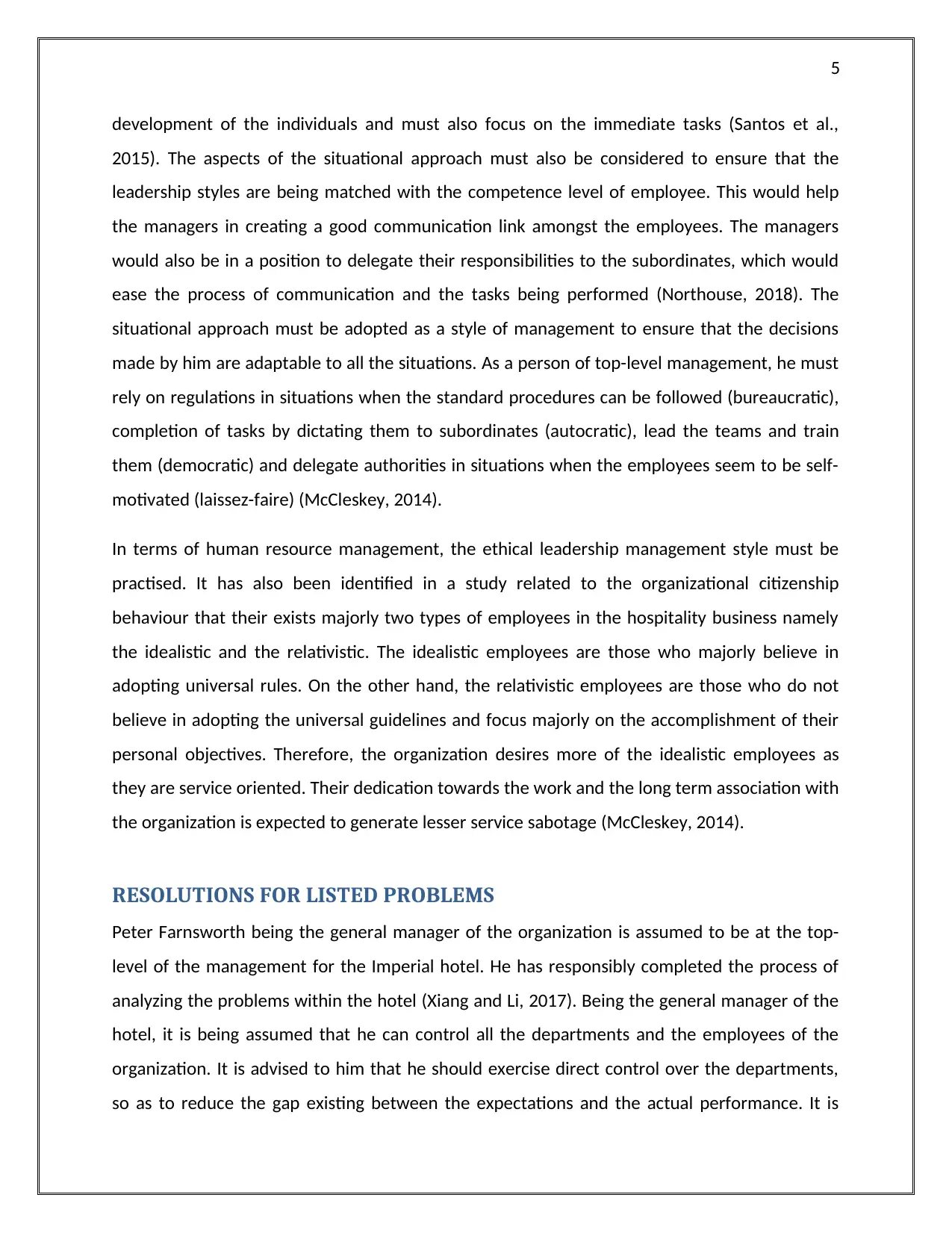
5
development of the individuals and must also focus on the immediate tasks (Santos et al.,
2015). The aspects of the situational approach must also be considered to ensure that the
leadership styles are being matched with the competence level of employee. This would help
the managers in creating a good communication link amongst the employees. The managers
would also be in a position to delegate their responsibilities to the subordinates, which would
ease the process of communication and the tasks being performed (Northouse, 2018). The
situational approach must be adopted as a style of management to ensure that the decisions
made by him are adaptable to all the situations. As a person of top-level management, he must
rely on regulations in situations when the standard procedures can be followed (bureaucratic),
completion of tasks by dictating them to subordinates (autocratic), lead the teams and train
them (democratic) and delegate authorities in situations when the employees seem to be self-
motivated (laissez-faire) (McCleskey, 2014).
In terms of human resource management, the ethical leadership management style must be
practised. It has also been identified in a study related to the organizational citizenship
behaviour that their exists majorly two types of employees in the hospitality business namely
the idealistic and the relativistic. The idealistic employees are those who majorly believe in
adopting universal rules. On the other hand, the relativistic employees are those who do not
believe in adopting the universal guidelines and focus majorly on the accomplishment of their
personal objectives. Therefore, the organization desires more of the idealistic employees as
they are service oriented. Their dedication towards the work and the long term association with
the organization is expected to generate lesser service sabotage (McCleskey, 2014).
RESOLUTIONS FOR LISTED PROBLEMS
Peter Farnsworth being the general manager of the organization is assumed to be at the top-
level of the management for the Imperial hotel. He has responsibly completed the process of
analyzing the problems within the hotel (Xiang and Li, 2017). Being the general manager of the
hotel, it is being assumed that he can control all the departments and the employees of the
organization. It is advised to him that he should exercise direct control over the departments,
so as to reduce the gap existing between the expectations and the actual performance. It is
development of the individuals and must also focus on the immediate tasks (Santos et al.,
2015). The aspects of the situational approach must also be considered to ensure that the
leadership styles are being matched with the competence level of employee. This would help
the managers in creating a good communication link amongst the employees. The managers
would also be in a position to delegate their responsibilities to the subordinates, which would
ease the process of communication and the tasks being performed (Northouse, 2018). The
situational approach must be adopted as a style of management to ensure that the decisions
made by him are adaptable to all the situations. As a person of top-level management, he must
rely on regulations in situations when the standard procedures can be followed (bureaucratic),
completion of tasks by dictating them to subordinates (autocratic), lead the teams and train
them (democratic) and delegate authorities in situations when the employees seem to be self-
motivated (laissez-faire) (McCleskey, 2014).
In terms of human resource management, the ethical leadership management style must be
practised. It has also been identified in a study related to the organizational citizenship
behaviour that their exists majorly two types of employees in the hospitality business namely
the idealistic and the relativistic. The idealistic employees are those who majorly believe in
adopting universal rules. On the other hand, the relativistic employees are those who do not
believe in adopting the universal guidelines and focus majorly on the accomplishment of their
personal objectives. Therefore, the organization desires more of the idealistic employees as
they are service oriented. Their dedication towards the work and the long term association with
the organization is expected to generate lesser service sabotage (McCleskey, 2014).
RESOLUTIONS FOR LISTED PROBLEMS
Peter Farnsworth being the general manager of the organization is assumed to be at the top-
level of the management for the Imperial hotel. He has responsibly completed the process of
analyzing the problems within the hotel (Xiang and Li, 2017). Being the general manager of the
hotel, it is being assumed that he can control all the departments and the employees of the
organization. It is advised to him that he should exercise direct control over the departments,
so as to reduce the gap existing between the expectations and the actual performance. It is
⊘ This is a preview!⊘
Do you want full access?
Subscribe today to unlock all pages.

Trusted by 1+ million students worldwide
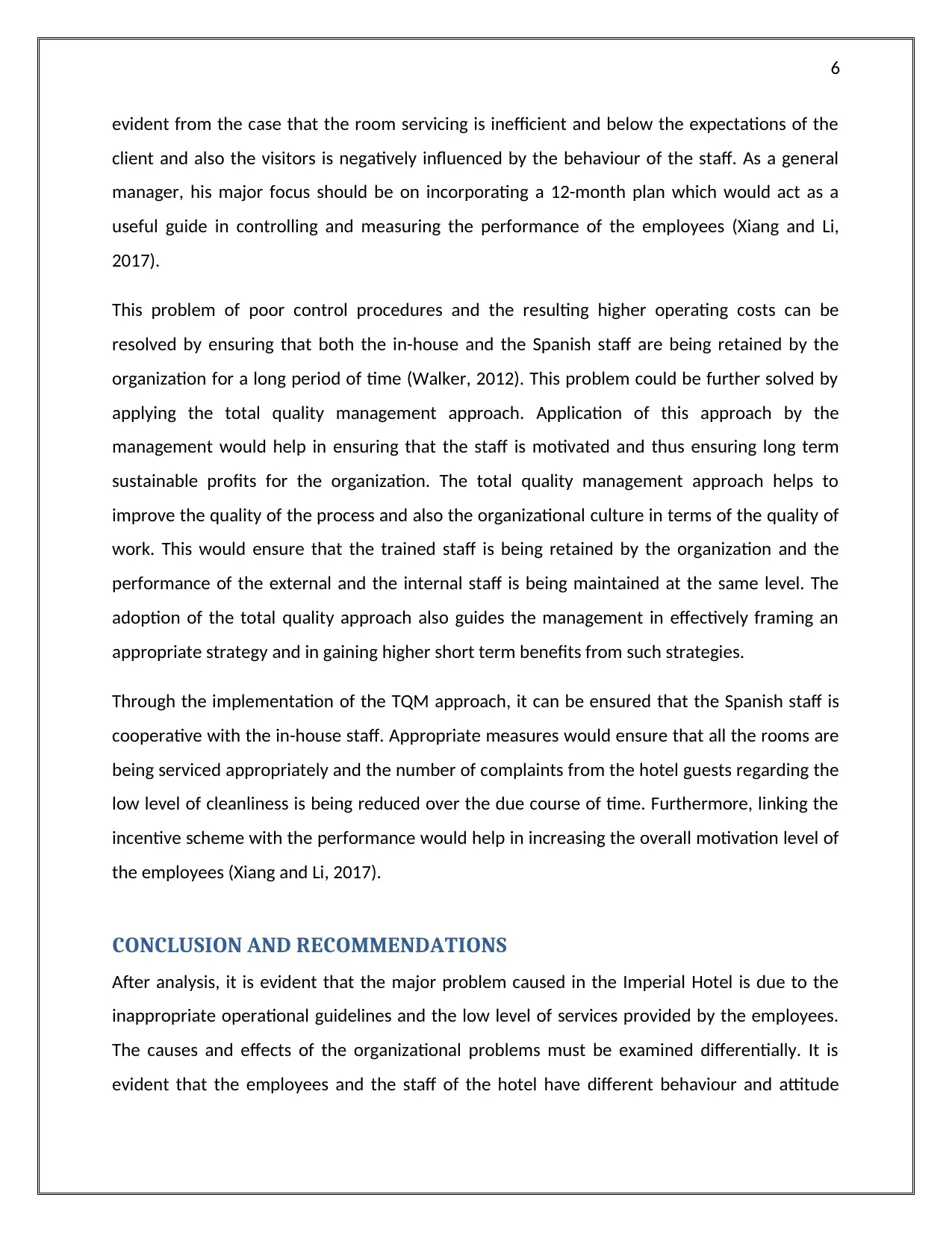
6
evident from the case that the room servicing is inefficient and below the expectations of the
client and also the visitors is negatively influenced by the behaviour of the staff. As a general
manager, his major focus should be on incorporating a 12-month plan which would act as a
useful guide in controlling and measuring the performance of the employees (Xiang and Li,
2017).
This problem of poor control procedures and the resulting higher operating costs can be
resolved by ensuring that both the in-house and the Spanish staff are being retained by the
organization for a long period of time (Walker, 2012). This problem could be further solved by
applying the total quality management approach. Application of this approach by the
management would help in ensuring that the staff is motivated and thus ensuring long term
sustainable profits for the organization. The total quality management approach helps to
improve the quality of the process and also the organizational culture in terms of the quality of
work. This would ensure that the trained staff is being retained by the organization and the
performance of the external and the internal staff is being maintained at the same level. The
adoption of the total quality approach also guides the management in effectively framing an
appropriate strategy and in gaining higher short term benefits from such strategies.
Through the implementation of the TQM approach, it can be ensured that the Spanish staff is
cooperative with the in-house staff. Appropriate measures would ensure that all the rooms are
being serviced appropriately and the number of complaints from the hotel guests regarding the
low level of cleanliness is being reduced over the due course of time. Furthermore, linking the
incentive scheme with the performance would help in increasing the overall motivation level of
the employees (Xiang and Li, 2017).
CONCLUSION AND RECOMMENDATIONS
After analysis, it is evident that the major problem caused in the Imperial Hotel is due to the
inappropriate operational guidelines and the low level of services provided by the employees.
The causes and effects of the organizational problems must be examined differentially. It is
evident that the employees and the staff of the hotel have different behaviour and attitude
evident from the case that the room servicing is inefficient and below the expectations of the
client and also the visitors is negatively influenced by the behaviour of the staff. As a general
manager, his major focus should be on incorporating a 12-month plan which would act as a
useful guide in controlling and measuring the performance of the employees (Xiang and Li,
2017).
This problem of poor control procedures and the resulting higher operating costs can be
resolved by ensuring that both the in-house and the Spanish staff are being retained by the
organization for a long period of time (Walker, 2012). This problem could be further solved by
applying the total quality management approach. Application of this approach by the
management would help in ensuring that the staff is motivated and thus ensuring long term
sustainable profits for the organization. The total quality management approach helps to
improve the quality of the process and also the organizational culture in terms of the quality of
work. This would ensure that the trained staff is being retained by the organization and the
performance of the external and the internal staff is being maintained at the same level. The
adoption of the total quality approach also guides the management in effectively framing an
appropriate strategy and in gaining higher short term benefits from such strategies.
Through the implementation of the TQM approach, it can be ensured that the Spanish staff is
cooperative with the in-house staff. Appropriate measures would ensure that all the rooms are
being serviced appropriately and the number of complaints from the hotel guests regarding the
low level of cleanliness is being reduced over the due course of time. Furthermore, linking the
incentive scheme with the performance would help in increasing the overall motivation level of
the employees (Xiang and Li, 2017).
CONCLUSION AND RECOMMENDATIONS
After analysis, it is evident that the major problem caused in the Imperial Hotel is due to the
inappropriate operational guidelines and the low level of services provided by the employees.
The causes and effects of the organizational problems must be examined differentially. It is
evident that the employees and the staff of the hotel have different behaviour and attitude
Paraphrase This Document
Need a fresh take? Get an instant paraphrase of this document with our AI Paraphraser
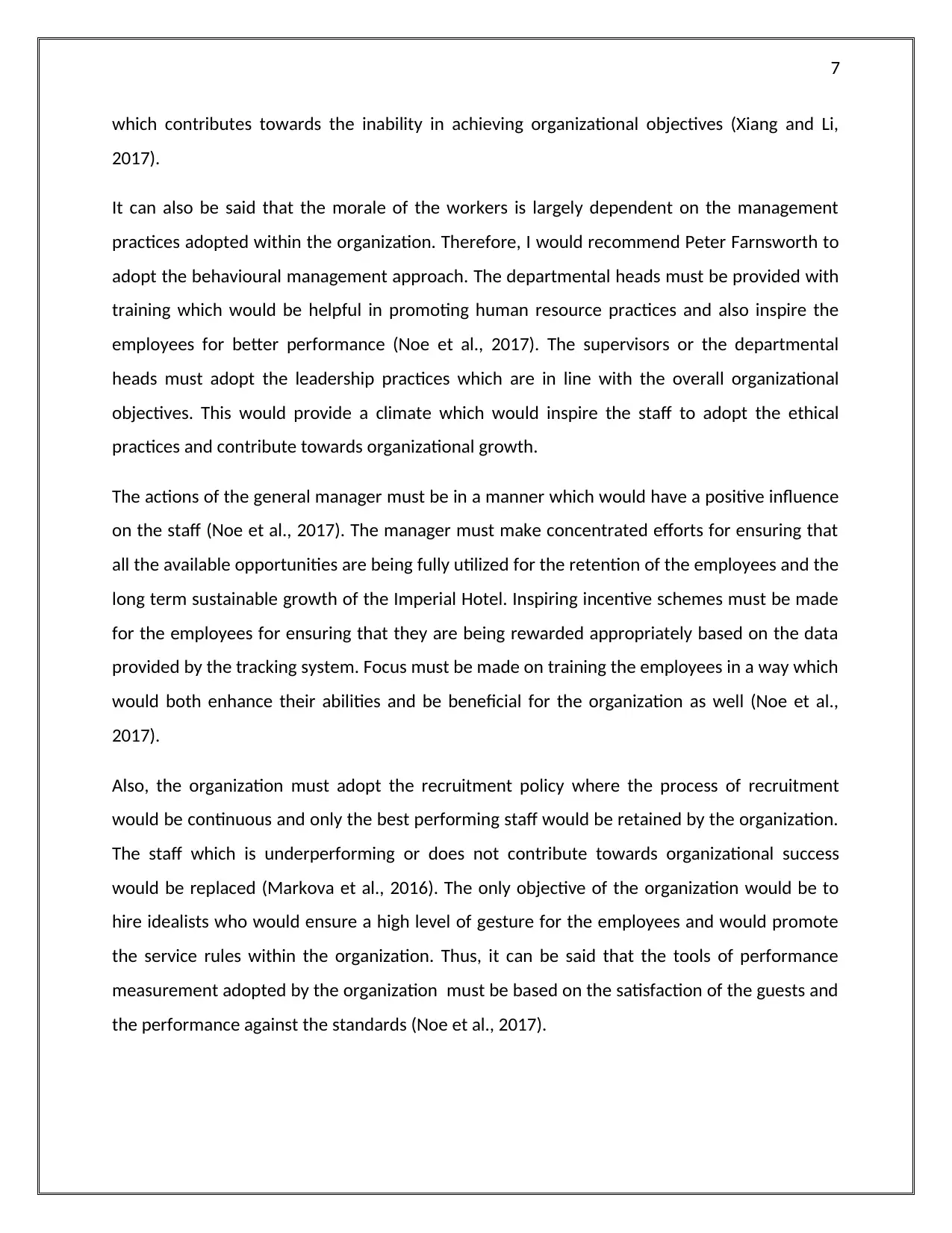
7
which contributes towards the inability in achieving organizational objectives (Xiang and Li,
2017).
It can also be said that the morale of the workers is largely dependent on the management
practices adopted within the organization. Therefore, I would recommend Peter Farnsworth to
adopt the behavioural management approach. The departmental heads must be provided with
training which would be helpful in promoting human resource practices and also inspire the
employees for better performance (Noe et al., 2017). The supervisors or the departmental
heads must adopt the leadership practices which are in line with the overall organizational
objectives. This would provide a climate which would inspire the staff to adopt the ethical
practices and contribute towards organizational growth.
The actions of the general manager must be in a manner which would have a positive influence
on the staff (Noe et al., 2017). The manager must make concentrated efforts for ensuring that
all the available opportunities are being fully utilized for the retention of the employees and the
long term sustainable growth of the Imperial Hotel. Inspiring incentive schemes must be made
for the employees for ensuring that they are being rewarded appropriately based on the data
provided by the tracking system. Focus must be made on training the employees in a way which
would both enhance their abilities and be beneficial for the organization as well (Noe et al.,
2017).
Also, the organization must adopt the recruitment policy where the process of recruitment
would be continuous and only the best performing staff would be retained by the organization.
The staff which is underperforming or does not contribute towards organizational success
would be replaced (Markova et al., 2016). The only objective of the organization would be to
hire idealists who would ensure a high level of gesture for the employees and would promote
the service rules within the organization. Thus, it can be said that the tools of performance
measurement adopted by the organization must be based on the satisfaction of the guests and
the performance against the standards (Noe et al., 2017).
which contributes towards the inability in achieving organizational objectives (Xiang and Li,
2017).
It can also be said that the morale of the workers is largely dependent on the management
practices adopted within the organization. Therefore, I would recommend Peter Farnsworth to
adopt the behavioural management approach. The departmental heads must be provided with
training which would be helpful in promoting human resource practices and also inspire the
employees for better performance (Noe et al., 2017). The supervisors or the departmental
heads must adopt the leadership practices which are in line with the overall organizational
objectives. This would provide a climate which would inspire the staff to adopt the ethical
practices and contribute towards organizational growth.
The actions of the general manager must be in a manner which would have a positive influence
on the staff (Noe et al., 2017). The manager must make concentrated efforts for ensuring that
all the available opportunities are being fully utilized for the retention of the employees and the
long term sustainable growth of the Imperial Hotel. Inspiring incentive schemes must be made
for the employees for ensuring that they are being rewarded appropriately based on the data
provided by the tracking system. Focus must be made on training the employees in a way which
would both enhance their abilities and be beneficial for the organization as well (Noe et al.,
2017).
Also, the organization must adopt the recruitment policy where the process of recruitment
would be continuous and only the best performing staff would be retained by the organization.
The staff which is underperforming or does not contribute towards organizational success
would be replaced (Markova et al., 2016). The only objective of the organization would be to
hire idealists who would ensure a high level of gesture for the employees and would promote
the service rules within the organization. Thus, it can be said that the tools of performance
measurement adopted by the organization must be based on the satisfaction of the guests and
the performance against the standards (Noe et al., 2017).
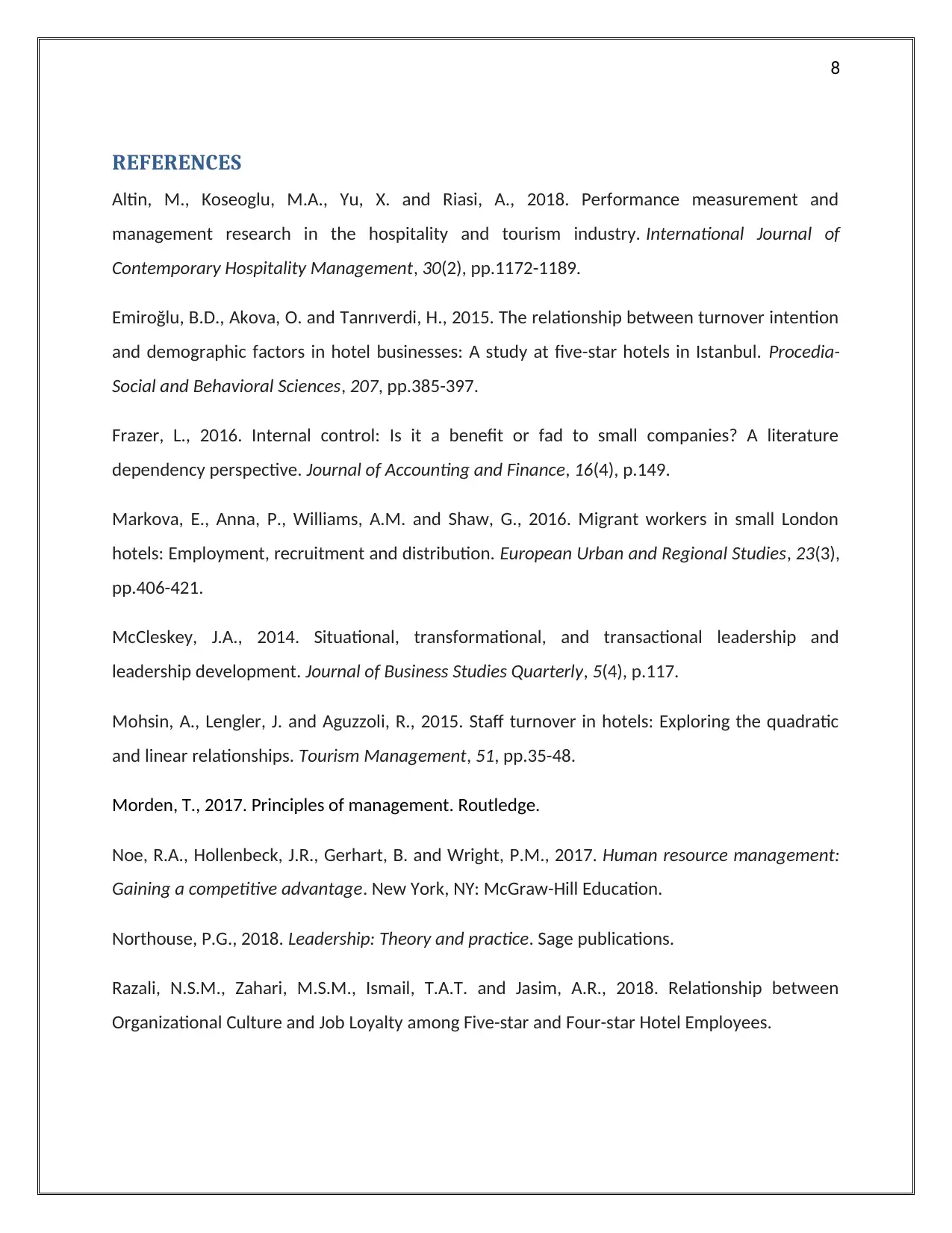
8
REFERENCES
Altin, M., Koseoglu, M.A., Yu, X. and Riasi, A., 2018. Performance measurement and
management research in the hospitality and tourism industry. International Journal of
Contemporary Hospitality Management, 30(2), pp.1172-1189.
Emiroğlu, B.D., Akova, O. and Tanrıverdi, H., 2015. The relationship between turnover intention
and demographic factors in hotel businesses: A study at five-star hotels in Istanbul. Procedia-
Social and Behavioral Sciences, 207, pp.385-397.
Frazer, L., 2016. Internal control: Is it a benefit or fad to small companies? A literature
dependency perspective. Journal of Accounting and Finance, 16(4), p.149.
Markova, E., Anna, P., Williams, A.M. and Shaw, G., 2016. Migrant workers in small London
hotels: Employment, recruitment and distribution. European Urban and Regional Studies, 23(3),
pp.406-421.
McCleskey, J.A., 2014. Situational, transformational, and transactional leadership and
leadership development. Journal of Business Studies Quarterly, 5(4), p.117.
Mohsin, A., Lengler, J. and Aguzzoli, R., 2015. Staff turnover in hotels: Exploring the quadratic
and linear relationships. Tourism Management, 51, pp.35-48.
Morden, T., 2017. Principles of management. Routledge.
Noe, R.A., Hollenbeck, J.R., Gerhart, B. and Wright, P.M., 2017. Human resource management:
Gaining a competitive advantage. New York, NY: McGraw-Hill Education.
Northouse, P.G., 2018. Leadership: Theory and practice. Sage publications.
Razali, N.S.M., Zahari, M.S.M., Ismail, T.A.T. and Jasim, A.R., 2018. Relationship between
Organizational Culture and Job Loyalty among Five-star and Four-star Hotel Employees.
REFERENCES
Altin, M., Koseoglu, M.A., Yu, X. and Riasi, A., 2018. Performance measurement and
management research in the hospitality and tourism industry. International Journal of
Contemporary Hospitality Management, 30(2), pp.1172-1189.
Emiroğlu, B.D., Akova, O. and Tanrıverdi, H., 2015. The relationship between turnover intention
and demographic factors in hotel businesses: A study at five-star hotels in Istanbul. Procedia-
Social and Behavioral Sciences, 207, pp.385-397.
Frazer, L., 2016. Internal control: Is it a benefit or fad to small companies? A literature
dependency perspective. Journal of Accounting and Finance, 16(4), p.149.
Markova, E., Anna, P., Williams, A.M. and Shaw, G., 2016. Migrant workers in small London
hotels: Employment, recruitment and distribution. European Urban and Regional Studies, 23(3),
pp.406-421.
McCleskey, J.A., 2014. Situational, transformational, and transactional leadership and
leadership development. Journal of Business Studies Quarterly, 5(4), p.117.
Mohsin, A., Lengler, J. and Aguzzoli, R., 2015. Staff turnover in hotels: Exploring the quadratic
and linear relationships. Tourism Management, 51, pp.35-48.
Morden, T., 2017. Principles of management. Routledge.
Noe, R.A., Hollenbeck, J.R., Gerhart, B. and Wright, P.M., 2017. Human resource management:
Gaining a competitive advantage. New York, NY: McGraw-Hill Education.
Northouse, P.G., 2018. Leadership: Theory and practice. Sage publications.
Razali, N.S.M., Zahari, M.S.M., Ismail, T.A.T. and Jasim, A.R., 2018. Relationship between
Organizational Culture and Job Loyalty among Five-star and Four-star Hotel Employees.
⊘ This is a preview!⊘
Do you want full access?
Subscribe today to unlock all pages.

Trusted by 1+ million students worldwide
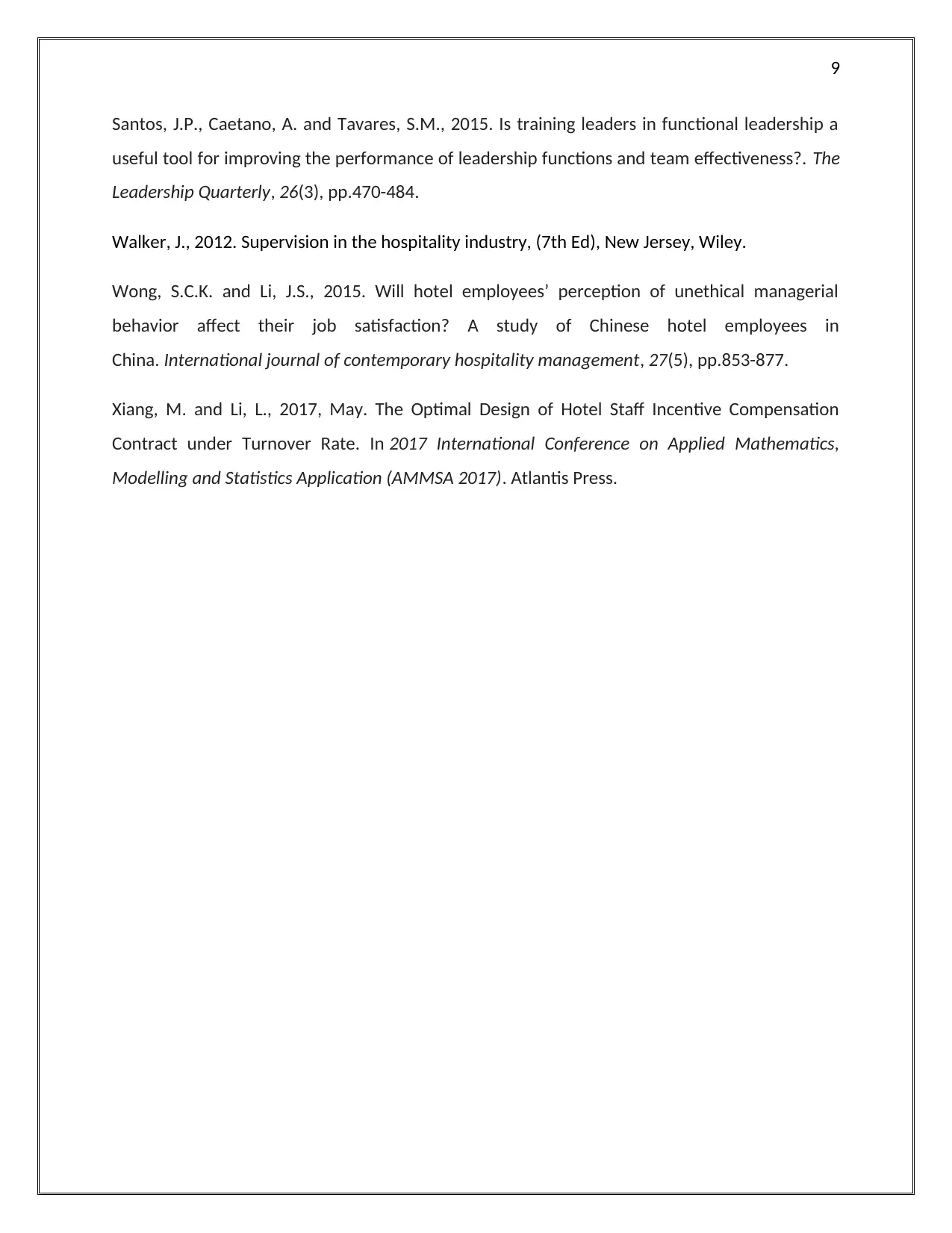
9
Santos, J.P., Caetano, A. and Tavares, S.M., 2015. Is training leaders in functional leadership a
useful tool for improving the performance of leadership functions and team effectiveness?. The
Leadership Quarterly, 26(3), pp.470-484.
Walker, J., 2012. Supervision in the hospitality industry, (7th Ed), New Jersey, Wiley.
Wong, S.C.K. and Li, J.S., 2015. Will hotel employees’ perception of unethical managerial
behavior affect their job satisfaction? A study of Chinese hotel employees in
China. International journal of contemporary hospitality management, 27(5), pp.853-877.
Xiang, M. and Li, L., 2017, May. The Optimal Design of Hotel Staff Incentive Compensation
Contract under Turnover Rate. In 2017 International Conference on Applied Mathematics,
Modelling and Statistics Application (AMMSA 2017). Atlantis Press.
Santos, J.P., Caetano, A. and Tavares, S.M., 2015. Is training leaders in functional leadership a
useful tool for improving the performance of leadership functions and team effectiveness?. The
Leadership Quarterly, 26(3), pp.470-484.
Walker, J., 2012. Supervision in the hospitality industry, (7th Ed), New Jersey, Wiley.
Wong, S.C.K. and Li, J.S., 2015. Will hotel employees’ perception of unethical managerial
behavior affect their job satisfaction? A study of Chinese hotel employees in
China. International journal of contemporary hospitality management, 27(5), pp.853-877.
Xiang, M. and Li, L., 2017, May. The Optimal Design of Hotel Staff Incentive Compensation
Contract under Turnover Rate. In 2017 International Conference on Applied Mathematics,
Modelling and Statistics Application (AMMSA 2017). Atlantis Press.
Paraphrase This Document
Need a fresh take? Get an instant paraphrase of this document with our AI Paraphraser
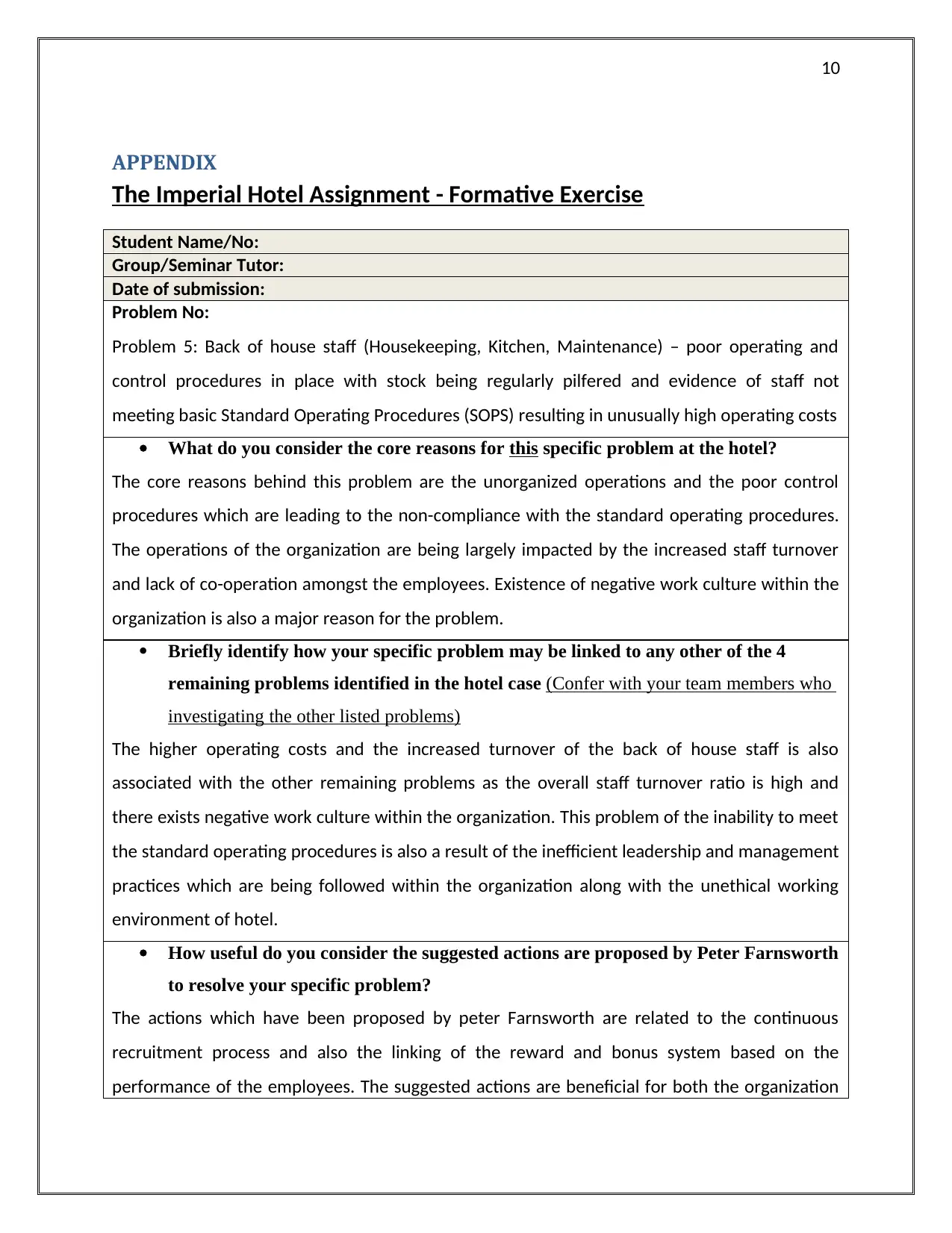
10
APPENDIX
The Imperial Hotel Assignment - Formative Exercise
Student Name/No:
Group/Seminar Tutor:
Date of submission:
Problem No:
Problem 5: Back of house staff (Housekeeping, Kitchen, Maintenance) – poor operating and
control procedures in place with stock being regularly pilfered and evidence of staff not
meeting basic Standard Operating Procedures (SOPS) resulting in unusually high operating costs
What do you consider the core reasons for this specific problem at the hotel?
The core reasons behind this problem are the unorganized operations and the poor control
procedures which are leading to the non-compliance with the standard operating procedures.
The operations of the organization are being largely impacted by the increased staff turnover
and lack of co-operation amongst the employees. Existence of negative work culture within the
organization is also a major reason for the problem.
Briefly identify how your specific problem may be linked to any other of the 4
remaining problems identified in the hotel case (Confer with your team members who
investigating the other listed problems)
The higher operating costs and the increased turnover of the back of house staff is also
associated with the other remaining problems as the overall staff turnover ratio is high and
there exists negative work culture within the organization. This problem of the inability to meet
the standard operating procedures is also a result of the inefficient leadership and management
practices which are being followed within the organization along with the unethical working
environment of hotel.
How useful do you consider the suggested actions are proposed by Peter Farnsworth
to resolve your specific problem?
The actions which have been proposed by peter Farnsworth are related to the continuous
recruitment process and also the linking of the reward and bonus system based on the
performance of the employees. The suggested actions are beneficial for both the organization
APPENDIX
The Imperial Hotel Assignment - Formative Exercise
Student Name/No:
Group/Seminar Tutor:
Date of submission:
Problem No:
Problem 5: Back of house staff (Housekeeping, Kitchen, Maintenance) – poor operating and
control procedures in place with stock being regularly pilfered and evidence of staff not
meeting basic Standard Operating Procedures (SOPS) resulting in unusually high operating costs
What do you consider the core reasons for this specific problem at the hotel?
The core reasons behind this problem are the unorganized operations and the poor control
procedures which are leading to the non-compliance with the standard operating procedures.
The operations of the organization are being largely impacted by the increased staff turnover
and lack of co-operation amongst the employees. Existence of negative work culture within the
organization is also a major reason for the problem.
Briefly identify how your specific problem may be linked to any other of the 4
remaining problems identified in the hotel case (Confer with your team members who
investigating the other listed problems)
The higher operating costs and the increased turnover of the back of house staff is also
associated with the other remaining problems as the overall staff turnover ratio is high and
there exists negative work culture within the organization. This problem of the inability to meet
the standard operating procedures is also a result of the inefficient leadership and management
practices which are being followed within the organization along with the unethical working
environment of hotel.
How useful do you consider the suggested actions are proposed by Peter Farnsworth
to resolve your specific problem?
The actions which have been proposed by peter Farnsworth are related to the continuous
recruitment process and also the linking of the reward and bonus system based on the
performance of the employees. The suggested actions are beneficial for both the organization
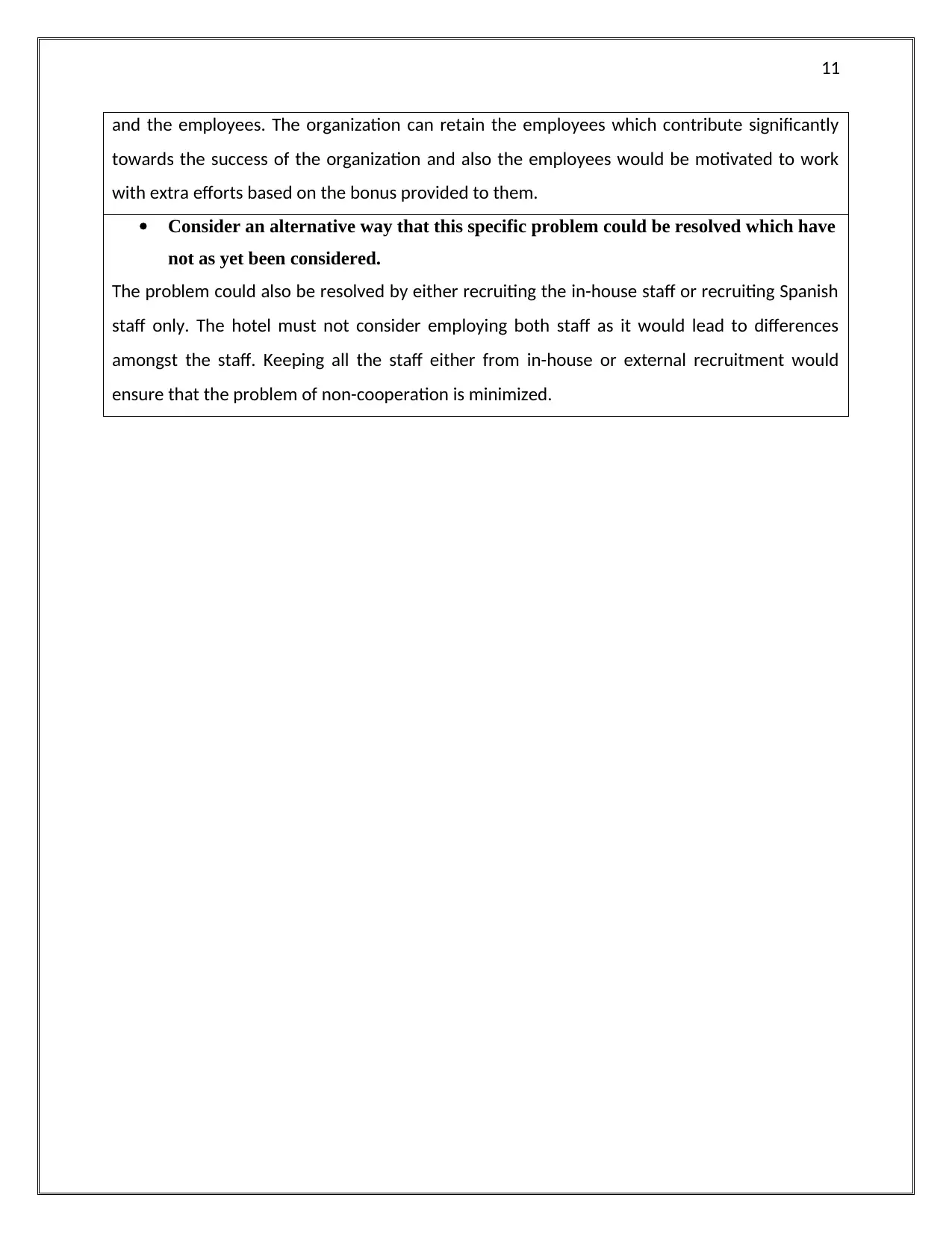
11
and the employees. The organization can retain the employees which contribute significantly
towards the success of the organization and also the employees would be motivated to work
with extra efforts based on the bonus provided to them.
Consider an alternative way that this specific problem could be resolved which have
not as yet been considered.
The problem could also be resolved by either recruiting the in-house staff or recruiting Spanish
staff only. The hotel must not consider employing both staff as it would lead to differences
amongst the staff. Keeping all the staff either from in-house or external recruitment would
ensure that the problem of non-cooperation is minimized.
and the employees. The organization can retain the employees which contribute significantly
towards the success of the organization and also the employees would be motivated to work
with extra efforts based on the bonus provided to them.
Consider an alternative way that this specific problem could be resolved which have
not as yet been considered.
The problem could also be resolved by either recruiting the in-house staff or recruiting Spanish
staff only. The hotel must not consider employing both staff as it would lead to differences
amongst the staff. Keeping all the staff either from in-house or external recruitment would
ensure that the problem of non-cooperation is minimized.
⊘ This is a preview!⊘
Do you want full access?
Subscribe today to unlock all pages.

Trusted by 1+ million students worldwide
1 out of 12
Related Documents
Your All-in-One AI-Powered Toolkit for Academic Success.
+13062052269
info@desklib.com
Available 24*7 on WhatsApp / Email
![[object Object]](/_next/static/media/star-bottom.7253800d.svg)
Unlock your academic potential
Copyright © 2020–2026 A2Z Services. All Rights Reserved. Developed and managed by ZUCOL.




